Putting Human Trafficking in the Spotlight
From February 3rd to February 5th, the Boston Initiative To Advance Human Rights ( BITAHR) is organizing a film forum to raise awareness about the epidemic crisis of human trafficking and to promote the cause of the anti-trafficking movement. Human trafficking victimizes millions of women and children worldwide, and should be considered modern day slavery. As a crime against basic human rights, human trafficking must be abolished, and BITAHR can be viewed as one of the major instigators of the abolitionist movement.
BITAHR is a non-profit organization which ambitious goal is to eliminate commercial sexual exploitation. The event, Fighting Trafficking Through Film, organized in collaboration with The Suffolk University Law School, will be held at the Modern Theater at Suffolk University in Boston. The three days forum will showcase domestic and foreign films about sex trafficking. BITAHR has also invited speakers to the international event. More than 40 guests speakers will participate in the forum’s discussions to share their own experiences and perspectives, and to help define coherent strategies to fight human trafficking both domestically and globally. The speakers will include politicians, authors, survivors, and international activists against human trafficking. Among them will be Congresswoman Carolyn Maloney, Kathryn Bolkovac, Representative Eugene O’ Flaherty, Rachel Lloyd (survivor and author), and Siddharth Kara (UN adviser on human trafficking). BITAHR’s Executive Director, Rebecca Merrill, took the time to give News Junkie Post an exclusive interview.
Gilbert Mercier: What triggered originally your interest in fighting human trafficking?
Rebecca Merrill: I was driven by the impact that “The Day My God Died”, a film featuring Anuradha Koirala and Maiti Nepal, had on me both personally and professionally. After nearly a year of research, and the development of my own documentary during law school, I had the opportunity to sit with Anuradha and to discuss life’s passion and how it often drives one’s career. During that meeting, Anuradha admonished me to listen to my heart and to open my ears. Her voice was delicate but commanding as she asked me simply: “How can you not be passionate when you listen to the stories of these women and girls? How can you not do something about it?” Those words, the stories had a lasting impact on my academic studies and now professional life. Alas. I think it is a wonderful complement to pair the human voice and images with the research and theory.
GM: Sex trafficking is a multi-billion global business which is getting more and more controlled by large organized crime networks and no longer by small time local pimps. Do you think we need a global strategy to fight such sophisticated criminal organizations, and if so what would you recommend?
RM: Absolutely. Second only to drug trafficking, human trafficking is the largest criminal industry in the world, and it is the fastest growing. We need a holistic and multifaceted international strategy just to keep up with the growth of the industry, never mind to eradicate it. There are numbers of non-profits, agencies and individuals doing great work around the world. That said, we really need national governments and law enforcement agencies to work together against trafficking. We need governments to recognize that victims of human trafficking are victims in need of social services, not criminals subject to detention and deportation. There are circumstances where return to countries of origin is appropriate, but agencies have the responsibility to ensure return isn’t directly into the hands of the victim’s traffickers. All too often, victims are simply deported to the countries from which they were recruited, most often subjecting them to the same vulnerable circumstances and a mixture of societal shamming, family rejection and condemnation, and an inability to rejoin the workforce. Moreover, the circumstances giving rise to vulnerability are not typically eliminated but rather exponentially and detrimentally worse. If governments worked together to provide victims with social services after exploitation abroad and at home, re-exploitation would not be such a threat. In addition, while we are seeing an increase in transnational crimes of exploitation, the “independent contractors”, if you will, still operate and regularly increase in number. This can be linked in large part to economics. Where there is a profit, particularly of the margin available through CSE ( Commercial Sex Exploitation), entrepreneurial criminals will find a way.
GM: Some countries, such as Germany, have legalized prostitution. Do you think it is a valid approach to end sex trafficking?
RM: No. I cannot recognize the legalization of prostitution as a valid way to end the sex trade. Legalization would not end modern-day slavery; it would simply empower pimps to continue manipulation and exploitation with less likelihood of identification because the line between “legal” and “illegal” would be so fuzzy. The rationale for legalizing prostitution is relatively easy to understand. Legislators, often pushed by well meaning advocates, may believe or accept that prostitution will happen regardless of legalization and, if legal, the laws will at least document the industry and license the “workers”, making it theoretically easier to provide healthcare and other services to prostituted women. There is also the feminist argument that a woman should be “empowered” to do what she wishes with her body, including selling sex. These arguments are flawed. Legalizing prostitution does not reduce the enormously harmful physical and psychological effects that being sexually exploited inherently caused. Women and girls who engage in prostitution do not choose to do so. The idea that prostitution is a choice does not take into account that in order to choose something, one needs to have several options to choose from. The majority of those in the sex trade- admittedly not 100 percent- in countries where prostitution is legal and illegal alike, are vulnerable to commercial sexual exploitation due to a complex set of circumstances often including economic desperation, unrest or instability in homes or even communities or countries, psychological manipulation and more, not because it is a viable choice.
GM: Traffickers make an extensive use of the Internet and even of social media site to lure, recruit and exploit victims. Should this type of activities be more closely monitored by law enforcement agencies with perhaps the help of anti-trafficking organizations, such as yours, acting as a network of whistle blowers?
RM: It is true. Traffickers may use social media sites to recruit underage girls into commercial sexual exploitation. Once recruited, sites like Backpage.com are used to advertise sex with the exploited individuals – children and adult alike. The illegal age of children is disguised using language like “youthful”, “fresh”, “barely legal”, “tight body”. The Internet provides anonymity for the exploiting pimps and endless “choice” and anonymous shopping and exploiting for johns who are purchasing sex. In some areas, ordering sex is easier and cheaper than ordering a pizza. Screen names and pseudonyms make it harder to identify and prosecute pimps. In addition the “handles” provide protection for johns from the negative stigma that buying sex should carry. In reality, companies that facilitate this type of exploitation like Backpage, for instance, are just as guilty as the pimps that exploit minors, because they too, are making hundreds of thousands of dollars off the sale of the bodies of very young girls. Not only should law enforcement agencies monitor this type of behavior, they should shut down websites. The problem is that regardless of our pointing out that commercial sexual exploitation is happening online, the criminal facilitation must be prosecuted and punished. In addition, advertisers must take some responsibility – if they voice their opinions by pulling ads and affecting the facilitators’ bottom line profitability.
GM: In a phone conversation we had sometime ago, you mentioned that we are living in a “hyper-sexual” world fueled by popular culture, online pornography etc, and that it could be one of the reasons why a substantial number of men seek commercial sex or indulge in “sex tourism”. Can you please elaborate on this?
RM: Of course. Over the past few decades we have seen a shift from the most risque magazines including one spread with a suggestively clad woman, to a society where pre-adolescent boys see literally hundreds of thousands of images of nudity before they even reach middle school. When sex education comes in the form of magazines, the Internet, song lyrics and popular culture instead of from teachers and parents, it can be a very confusing topic for young men and women alike. By hypersexualizing children at a disturbingly young ages, we have diminished the gap between buying the idea of sex in the form of a magazine subscription or a calendar to buying the act of sex in a massage parlor, in a hotel or car, or even in one’s own home. When we see so many sexual images of women in circumstances that suggest that they are happy naked, exposed, in sexually dominated manners, we are normalizing the notion that girls and women should be dominated, subordinated and subject to sexually violent and aggressive behavior. These progressive and persistent images make it harder to believe that exploited are victims. Moreover, products like “loungerie” or “lingerie for girls” for four to six year old girls feed into this idea of children as sex objects and “sexy” as ideal for children.
GM: A cynical view of commercial sex, and a stereotypical rationalization of it, would be to say that prostitution will never be eradicated because it is “the oldest profession in the world”. Do you think, one day, men and women will be able to free themselves from the sick correlation between sex and money?
RM: It is true that commercial sex has existed in various forms over centuries throughout most if not all countries. It is also true that women have historically been subjected to oppression, domination and silencing. I am not sure that as a society we will ever be able to eradicate the correlation between sex and money. It is my hope, however, that as this topic becomes a priority for the feminist movement and society at large- and as women everywhere continue to fight for equal opportunities- that one day women and girls will have sufficient opportunities that they will not be so vulnerable to coercion and forced to prostitution. Females need sufficient opportunity to utilize their skills and abilities in a productive way that positively contributes to society. It is also our organization’s goal to spread awareness- in collaboration with a global coalition- such that it minimizes demand by educating purchasers on the harmful, long-term repercussions their exploitative conduct has on children, families, and the community.
GM: In countries of origins for victims of traffickers, socio-economic factors play a huge role. Does your organization reach out to local organizations in human trafficking hubs such as Cambodia, Nepal, the Dominican Republic, Lithuania, Estonia, Nigeria and Ghana?
RM: We are cognizant of trafficking atrocities around the world and do our best to spread awareness about it in each and among all countries. We are mindful, however, that to utilize our resources effectively we cannot work in every country or every issue in the complex effort to combat trafficking. We focus most intensely on domestic trafficking, that which happens within the borders of the United States. We are also working in conjunction with a Congolese-US NGO, Promote Congo, on a program that will focus on aid for girls and boys being trafficked for labor or sexual exploitation in the artisanal mines in the Democratic Republic of the Congo.
GM: Do you think, realistically, that human trafficking can be one day abolished and how?
RM: At present human trafficking is extremely profitable for exploiters. If we apply a standard cost benefit analysis, we can see that the economic benefits of human trafficking far outweigh the miniscule risk(cost) of being prosecuted and the repercussions that might follow. As long as human trafficking is extremely profitable, criminals will continue to take the calculated risks. To reduce the occurrence of sex trafficking we must continue to raise the cost associated with prosecution, so that the risk of being caught and punished is no longer worth the economic benefits of trafficking while simultaneously reducing the revenue. To achieve this, we must change the way society looks at trafficking. We must realize that the victims of this exploitation are just that-victims. Instead of thinking of labor trafficking as poor individuals deserving of unfair labor standards or girls that “wear too much make-up” or “parade around in provocative clothing” as criminal prostitutes, we must identify these exploited people as victims and publish the traffickers. Without this identification, victims will continue to be plagued with negative stigmas, fear and vulnerability-some of the factors that very likely led to the exploitation at the onset.
GM: It is your organization’s first film forum. Do you have other events in preparation?
RM: BITAHR 2012 Film Forum: “Fighting Trafficking Through Film” is the second annual forum. Our first forum in December 2010 engaged audiences in compelling discussions. We also host periodic benefit concerts called (human) Traffic Jams, where we use music to bring together a community of young adults to raise awareness for the cause and begin a conversation that we hope continues throughout circles of friends, students, colleagues, neighbors, families, and more. This ongoing dialogue shines a light in what is currently hidden in plain sight-the commercial sexual exploitation of people. We also screen individual films throughout the year followed with gripping panels of experts in the field, again to generate a critical conversation and a reverberating call to action to end human trafficking. This March, we will host a conference on International Women’s Day entitled “Ending Impunity for Sexual Violence”. In addition, we will host a three part film series on organ trafficking in collaboration with a local university.
Editor’s Note: Photographs one and two (from top down) by Gilbert Mercier, other photographs and illustrations courtesy of BITAHR.
Related Articles





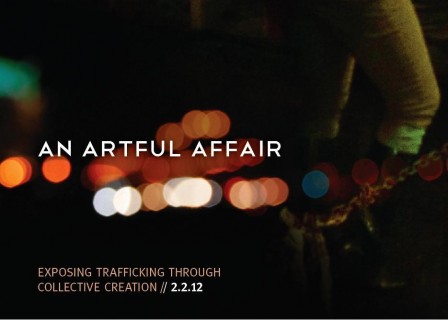
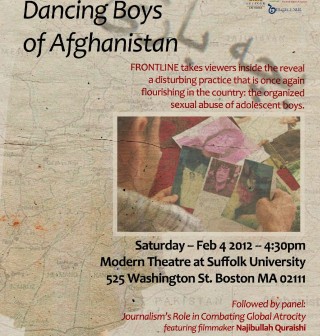
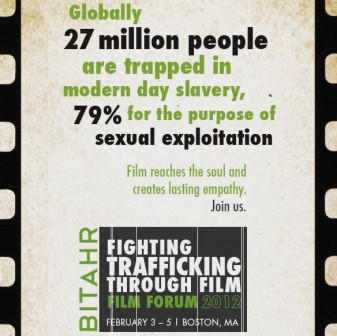
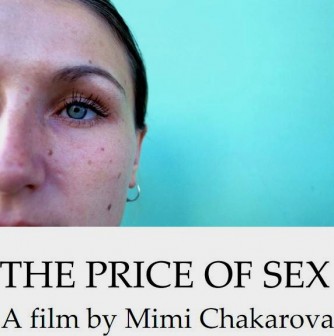
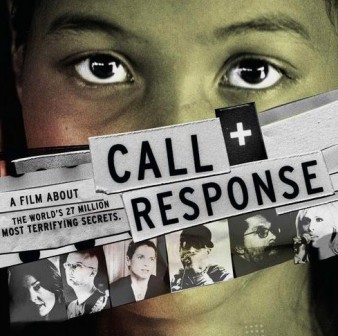











You must be logged in to post a comment Login